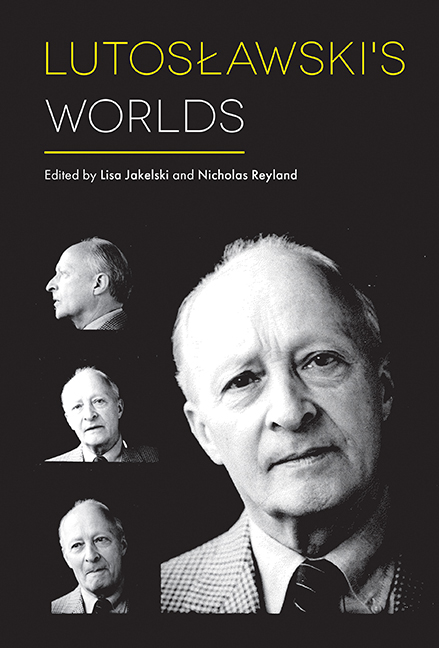Book contents
- Frontmatter
- Dedication
- Contents
- List of Figures
- List of Tables
- List of Music Examples
- List of Contributors
- Acknowledgements
- Introduction
- PART I mourning, modernism, and genius
- 1 Witold Lutoslawski's Muzyka zalobna (1958) and the Construction of Genius
- 2 Personal Loss, Cultural Grief, and Lutoslawski's Music of Mourning
- 3 Lutoslawski's String Quartet: Mourning, Melancholia, and Modern Subjectivity
- PART II other lutoslawskis
- PART III documents
- PART IV political engagement
- PART V legacies
- Bibliography
- Index
1 - Witold Lutoslawski's Muzyka zalobna (1958) and the Construction of Genius
from PART I - mourning, modernism, and genius
Published online by Cambridge University Press: 14 June 2019
- Frontmatter
- Dedication
- Contents
- List of Figures
- List of Tables
- List of Music Examples
- List of Contributors
- Acknowledgements
- Introduction
- PART I mourning, modernism, and genius
- 1 Witold Lutoslawski's Muzyka zalobna (1958) and the Construction of Genius
- 2 Personal Loss, Cultural Grief, and Lutoslawski's Music of Mourning
- 3 Lutoslawski's String Quartet: Mourning, Melancholia, and Modern Subjectivity
- PART II other lutoslawskis
- PART III documents
- PART IV political engagement
- PART V legacies
- Bibliography
- Index
Summary
Shortly after the March 1958 premiere of Witold Lutosławski's Muzyka żałobna (Music of Mourning) for string ensemble, young music critic Bohdan Pilarski proclaimed that the performance marked a ‘New Celebration of Polish Music’. Beyond providing a description or analysis in his review, Pilarski seemed most concerned that his audience would grasp this work's significance. Muzyka żałobna represented a sea-change, setting a new standard by which future compositions would be judged in post-war Poland:
At the moment when a new work appears – a work whose weight immediately gives it an exceptional significance – the established understanding of artistic phenomena is shaken. … This is not just because the work, as a result of its novelty, appears particularly interesting in the moment. Such a work moves the constellations, expands the borders of experience, of criteria and of outlook. … Muzyka żałobna by Witold Lutosławski has this power to move the constellations. … Such achievements have not occurred in Polish music since Szymanowski.
Pilarski offers Muzyka żałobna as evidence that Lutosławski was a composer who was not satisfied merely to ply his craft, or to work within the bounds of musical conventions. Rather, he was driven to defy those conventions and to write music that would express his original creative voice. This was music that was truly new; it had the power to change everything, revitalizing and reinvigorating Polish musical tradition to an extent that had not been seen, in Pilarski's estimation, since the interwar efforts of Karol Szymanowski (1882–1937).
Pilarski's review was by no means unique in its praise of Lutosławski's composition. Indeed, many Polish critics of various ages and aesthetic orientations greeted Muzyka żałobna with enthusiasm. They pointed to the work as a sign that Polish music was moving in a new direction: it was moving away from the stultifying aesthetic isolationism and socialist-realist conservatism of the Stalinist period and towards an active participation with contemporary, international (Western) musical culture. As the composer of this piece, Lutosławski found himself suddenly elected to genius status, the latest in a line of Polish genius-composers stretching back to Fryderyk Chopin. Critics and other composers expected him to lead Polish music forward, but not through the blind pursuit of progress. Rather, they wanted him to synthesize new musical languages – and, in particular, dodecaphony – within a Polish cultural tradition.
- Type
- Chapter
- Information
- Lutoslawski's Worlds , pp. 15 - 38Publisher: Boydell & BrewerPrint publication year: 2018



